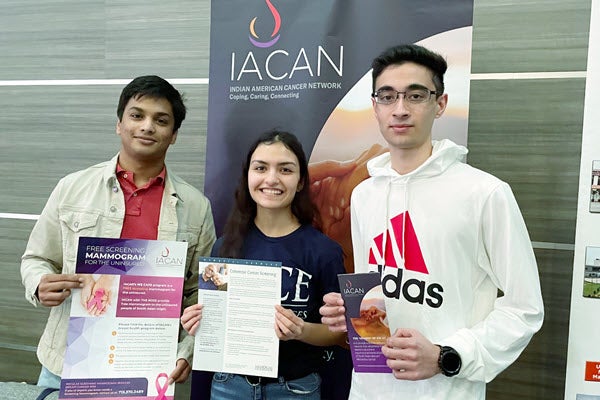Every year, a cohort of 10 to 15 Rice undergraduates design and implement capstone projects in collaboration with a community partner to address a social issue of their choosing. Once complete, students earn the Certificate in Civic Leadership, an academic and experiential learning certificate, offered by the Center for Civic Leadership (CCL).
The certificate supports students growth through a series of elective courses and scaffolded experiential learning programs designed to develop students’ understanding of social justice, ethical community engagement and critical reflection. Capstone projects serve as the final step in completing the certificate.

In the capstone course, students use the knowledge and skills they’ve developed through their certificate trajectory to take on the challenge of identifying and developing a community partnership and articulating a project proposal that will build on the capacity of that partner. They then self-manage the implementation, assessment and reporting of their project.
This year, students are working on projects including program assessment, data collection and analysis to inform planning, advocacy campaigns, and resource development. Community partners engaged in these projects include Texas Center for Justice and Equity, Daya Houston, and the Harris County Office of Sustainability.
Malaika Bergner ’23 chose the Convict Leasing and Labor Project (CLLP) as her community partner because she wanted to work with an advocacy grassroots organization. Bergner’s project, “Preserving the Sugarland 95: Advocating for Truth and Justice,” focuses on uplifting the story of the 95 African American victims of convict leasing, whose remains were recovered on land owned by the Fort Bend Independent School District (FBISD).
Through the development of a fact-checking video and a “report card” on the ethical handling of the burial site by FBISD, Bergner aims to help CLLP bring attention to the injustices perpetrated on the victims and their families/descendants.
Soumya Somani ’23 leveraged an existing partnership with the Indian American Cancer Network (IACAN) — an organization he was introduced to and engaged with under the guidance of Cassandra Diep, assistant teaching professor in Rice’s kinesiology department. Somani’s capstone focuses on the data analysis for a larger project, funded by the Rich Family Endowment, that he’s working on with fellow Rice students Shonik Ganjoo ’24 and Shivani Kulkarni ’24, aiming to understand the sociocultural barriers to breast cancer screening in the Asian Indian community.
In response to disproportionately low cancer screening rates in this community nationally, the team worked with IACAN to develop and locally disseminate a survey to gauge knowledge, attitudes, and perceptions around breast cancer and cancer screening. Somani is working on data analysis to help shape informed educational interventions aimed at improving screening rates among Asian Indians in the Houston area.
“I think Rice students are very aware and understand that there are many systems currently in place that stand to be improved upon and changed in meaningful ways,” said Rice alum Syed Shams ’22, who was a capstone student.
“Rice students can often be consumed by the feeling and want for change and improvement. The CCL capstone presents itself as a way to truly begin making some of that change while at Rice.”
For more information on the capstone in Civic Leadership or the Rich Family Endowment, visit ccl.rice.edu.
— Morgan B. KInney
Associate Director
Center for Civic Leadership
— Peyton Ball
Communications and Marketing Specialist
Center for Civic Leadership

